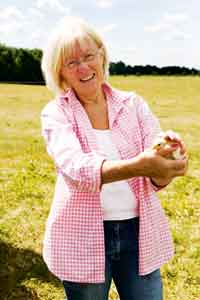2010 FW Awards: Livestock Adviser of the Year finalist – Christine Lees

Wth an agriculture degree from the Royal Agriculture College, Cirencester, and a qualification in homeopathy, it was only natural that Christine Lees of Homeopathy at Wellie Level should turn her attention to alternative therapy for farm animals.
“I had already done part of a homeopathy course before I went to Cirencester,” she says. “And I liked cows. So I put the two together for my dissertation: The role of homeopathy in the treatment of farm animals.”
During that time she says she talked with farmers and vets who were using homeopathy but not really knowing what they were doing. “There was very little support to go with it.”
As part of her dissertation, she ran a day at the college to talk to farmers about homeopathy. “A lot said they wanted more information. They said they always get the introduction – the hors d’oeuvre – but never the main course.
“No-one was helping farmers to do it, so I said: Shall we run a course?”
Bringing together a group of like-minded individuals who were all qualified homeopaths with farm experience, Mrs Lees ran her first course in November 2001.
The result was a three-day course spread over approximately six weeks so that the participants had time to go back to their farms and practise what they had learned.
“We agreed every course needed to be taught by a vet who was a qualified homeopath along with a second homeopath. I ran the syllabus,” she confirms.
“We felt three days was the maximum we could expect farmers to take off and the minimum we could give to the farmer given the size of this huge subject.”
Since then over 300 farmers and farm workers – a third of whom are from conventional rather than organic businesses – have attended the course and many keep in touch on a yearly basis through “continuation” days: “We’re giving them extra bricks on the ones they have already got,” she explains.
The courses are carefully planned. Day one is based around an introduction to homeopathy including key sessions on “the eight principles of homeopathy and the “big six” remedies,” plus on-farm practical animal observation.
Day two looks at treating acute cases with day three building on the first two days, and focusing on chronic illness.
“We’re giving them the framework in with which to make decisions,” Mrs Lees says. “The thrust is how you can fit homeopathy into your daily management as a tool. It’s important that you’re not trying to take the place of the vet.”
Hitherto, Mrs Lees has run the course as a non-for-profit business. “I only run courses when I have enough people to pay for the teachers. We do some advertising and when I have profit it’s ploughed back into advertising. Our rationale is not to make a huge amount of money but to help people use homeopathy properly.”
Support for her initiative has come from various sources including the Prince of Wales who donated £5000 at the start. “That went towards the marketing,” she says.
So what is the vision now?
“I’d like it to be established as some sort of charitable organisation where farmers get a lot more ongoing support. I’d like to do more information gathering and set up case studies, but we need to be properly established as an organisation with some funding so we can put it into marketing. I could see it where the homeopathy part could be part of a larger organisation looking at health.
“This all started as a little pilot study,” she concludes. “The opportunity is there to take it somewhere else.”
THE JUDGE LIKED
• Passion and enthusiasm for advancing homeopathy in animal welfare
• Ability to make complicated subject accessible
• Empowering the farmer to do it for themselves
• Unbiased and prepared to be part of the bigger picture on the farm
THE RIGHT THERAPY
“Our average vet bill is now down to about £10 a cow,” says John Newman, farm manager of organic Abbey Home Farm, near Cirencester.
“If you’re going to farm organically and use homeopathy, it’s essential to do the course.”
Liz Best, a tenant farmer from Tetbury, Gloucestershire, concurs. “Everything just clicked when I went on the course. It’s had a tremendous impact on the farm.”
• For more on the 2010 Farmers Weekly Awards
• For more on the 2010 finalists
